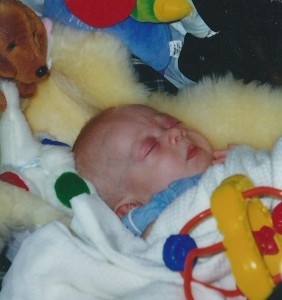
…Writing a Different Story
NavigationMatthew Wulf Case History, Years 5-9
In Matthew’s sixth year he had shown a consistent pattern of mild atonic seizures upon waking lasting from five to fifteen minutes. These seizures present with widening of the eyes, sometimes shivering, and a very brief loss of muscle tone with a head drop. Matthew’s neurologist attempted to control his seizure activity with a very low dose of Lamictal, but complications of capillary bleeding forced it to be discontinued.
In August of 2003 we experienced an interruption in Matthew’s supply of DHA-EE due to shipping difficulties. For a month Matthew took the Neuromins (DHA-TG) for the second time in his life (the first was for a month before he went to Spain). The unexpected happened; Matthew began to regress in all areas of gain. He stopped walking and resorted to crawling, frequently bumping into things. Food held no interest for him; he lost 4.5 pounds and his stools floated. Matthew’s ability to concentrate diminished. Once the shipping problems were resolved and the DHA-EE therapy resumed, Matthew progressed within a short ten days to eating well and walking again. This experience taught us how important the DHA-EE was for Matthew to survive.
November 2003 a MRI revealed good myelination throughout his brain except for tiny areas of immature maturation in the occipital area. There were no active lesions of demyelination.
Unaided hearing tests showed Matthew responding to voice at 65 decibels, a gain of 15 decibels, while aided hearing tests registered hearing at 35 decibel to voice. He had trouble hearing the soft consonant sounds, and frequently left them out of his speech.
Matthew’s vision continued to show slight improvement in small increments. The visual evoked potential recorded a shorter and shorter response time from the visual stimulation to registration in the occipital lobe. His ERG remained abnormal, though not extinguished as it was in the past. His optic nerves were showing some measurable response.
Matthew’s adrenal response to the ACTH hormone had begun to test low as Dra. Martinez watched closely for signs of adrenal insufficiency. Matthew exhibited the classic characteristics of adrenal insufficiency, the muscle wasting appearance as well as suddenly loosing his balance while standing. The time had come for supplementation.
In Spain, the Stauros Clinic’s physical therapist encouraged us to do some special exercises for Matthew’s hypotonic feet in hopes of negating a future surgery. These were daily added to his weekly routine of aquatic therapy and horseback riding as well as physical and occupational therapies.
Despite his diagnosis, Matthew seemed very healthy. Although he had developed a very thin appearance, his diet with supplementation was quite good. The year had been one of slow steady progress in all areas of development.
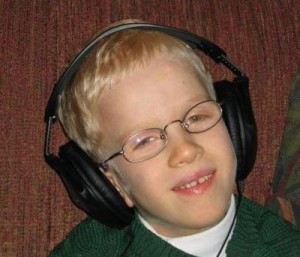

At seven years Matthew made history by his unique steady progress in brain maturation, hearing, vision, cognitive ability, and mobility. Matthew was able to independently go up and down stairs and attempted to run. As Matthew’s vision and hearing improved, so did his ability to imitate. He began imitating occasional vocalizations, engaging in vocal play, singing, and at one point, he even spoke a sentence. His socialization skills blossomed as he began to use a multi-meaning icon communication device, the VanGuard.
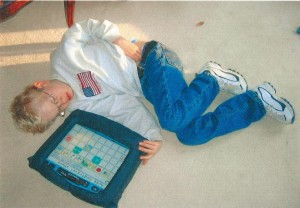
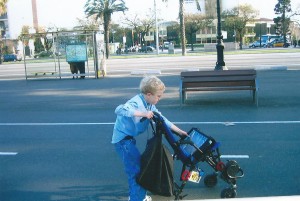
An amazing step took place when Matthew began to engage in daily meaningful interactions with print. His eyes often tracked print in a book; he recognized his printed name and some letters. Matthew participated in interactive reading using a page turning switch, repeating lines, TeckTalk, interactive boards, and started beginning to understand about asking questions. Influencing the world, Matthew’s remarkable progress in literacy has helped thousands of children and families across the country as his story is showcased in workshops for literacy and disabilities studies and through being on website, http://www.med.unc.edu/ahs/clds/resources/deaf-blind-model-classroom-resources/db-case-studies
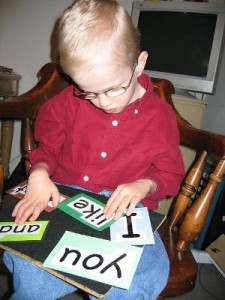
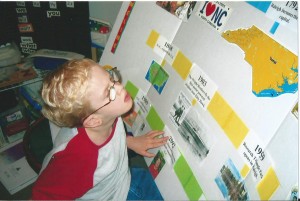
May tenth of Matthew’s seventh year, his hearing aids were permanently discarded due to functional hearing test disclosing his speech responses at 20 decibels, though inconsistent. Initially, Matthew stopped word vocalizations for a period of several months. Within the last two weeks of August Matthew imitated sound again. He said, “Mom” for the first time.
Participating actively in his school routine of shared reading and writing exercises, Matthew expressed a thirst for factual knowledge rather than fiction. Communication continued to be a major focus of his schooling. As a result, writing with his Vanguard became the primary means of interaction for him. One day Matthew wrote that he wanted to become a scientist “at home with you, Mom!”
Endocrine tests made it apparent Matthew needed support for his adrenal insufficiency. In June of his seventh year, Matthew began his life-long supplementation with hydrocortisone. His muscle wasting appearance disappeared as he gained weight, but also his anxiety and dizziness while standing subsided.
All Matthew’s lab tests were normal except for the slightly elevated liver functions and slightly elevated VLCFA’s typical of Persoxisomal Biognesis Disorders (Zellweger’s Syndrome). We continued with 200mg/day DHA-EE from Bizen fish oil and cholic acid from Dr. James Heubi.
Due to Matthew’s left foot having a collapsed arch, he continued to wear orthotics on both feet, despite undergoing daily therapy to help correct it. But Matthew did not letting it slow him down. Matthew’s exercise routine included walking (at least a half mile a day), riding his therapeutic tricycle, swimming, riding horseback, and bowling (he even beat Mom!).
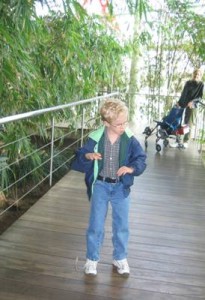
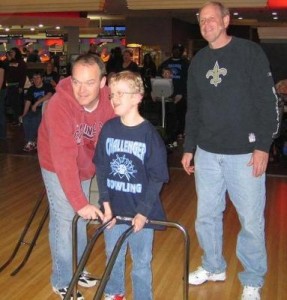
Success marked Matthew’s ninth year as well. Make-A-Wish foundatin granted his wish, “A swimming pool in the ocean with fireworks!” Just before his ninth birthday Matthew and his family embarked on a Disney Cruise to the Bahamas and Matthew met the “ship mouse,” Mickey Mouse. Editing his own “Wish Book,” Matthew preserved his memories of enjoying swimming on the ship and in the ocean.
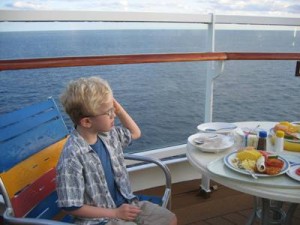
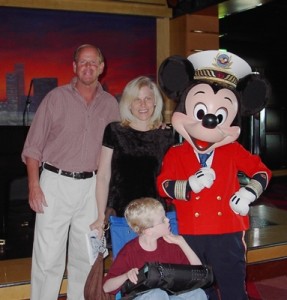
As his writing abilities developed, Matthew weekly wrote e-mails to professionals in the community and corresponded with a pen pal from Australia; Matthew interviewed weather men, e-mailed journalists, and even the local bank teller.
During Matthew’s fourteenth trip to Barcelona, he enjoyed chatting on his Vanguard, reading books, and listening to music on the headphones during the nine and a half hour flight. In Spain his participation in necessary testing was without the usually anxious anticipation, for now he had a means to choose a favorite activity to celebrate when finished. He often chose the aquarium, the Palace, or rose gardens, but the Sea was his favorite regardless of the time of year.
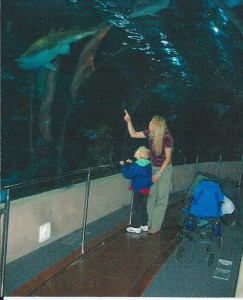
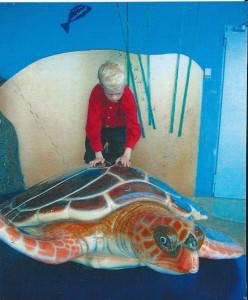
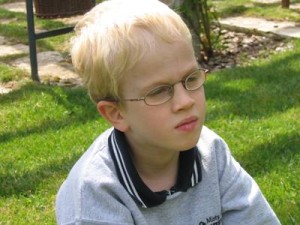
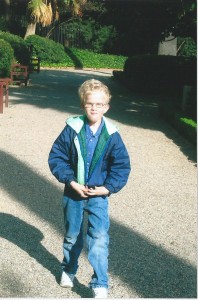
Matthew maintained a good memory of special places to visit in the city, commenting on them with his Vanguard as he went about and eventually he wrote a book about his experiences illustrating it with photographs. His test results in Spain were unremarkable, but his ERG was showing almost normal waves for his central vision. We had everything to celebrate!

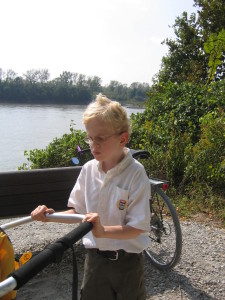
April 19, 2007 Matthew underwent cochlear implant surgery to correct inconsistencies in his hearing in his left ear. After three months of activation, a speech therapist noted 14 new vocalizations. Six months after activation, Matthew was observed discriminating between the “p” and the “t” sounds. With his cochlear implant, his significantly delayed response time to auditory input showed clear improvement.

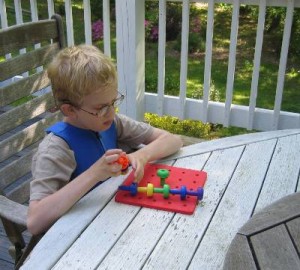
At the end of May 2007, Matthew was awarded the “Yes, I Can” Award for academic improvement as well as determination. Progressing from being an emergent reader to an early conventional reader, Matthew passed his third grade exams with excellent scores. Matthew’s greatest wish, “to help the children who cannot talk,” was fast becoming a reality. Matthew had come a very long way in writing a different story for Zellweger’s Syndrome!
